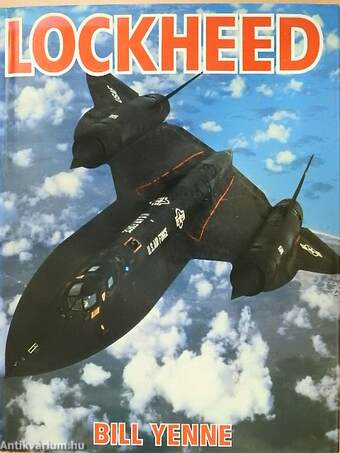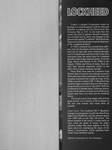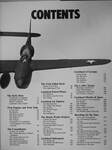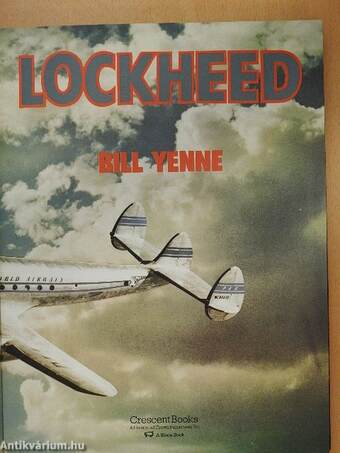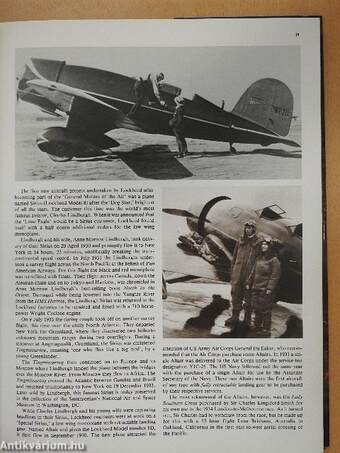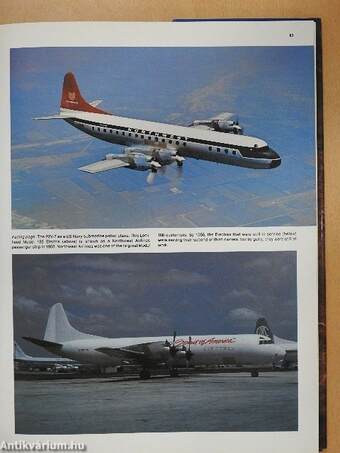1.067.894
kiadvánnyal nyújtjuk Magyarország legnagyobb antikvár könyv-kínálatát

VISSZA
A TETEJÉRE
JAVASLATOKÉszre-
vételek
Lockheed
| Kiadó: | Crescent Books |
|---|---|
| Kiadás helye: | New York |
| Kiadás éve: | |
| Kötés típusa: | Fűzött kemény papírkötés |
| Oldalszám: | 255 oldal |
| Sorozatcím: | |
| Kötetszám: | |
| Nyelv: | Angol |
| Méret: | 31 cm x 24 cm |
| ISBN: | 0-517-60471-X |
| Megjegyzés: | Színes és fekete-fehér fotókkal, illusztrációkkal. |
naponta értesítjük a beérkező friss
kiadványokról
naponta értesítjük a beérkező friss
kiadványokról
Fülszöveg
Today's Lockheed Corporation traces its heritage to a small floatplane, built by Alan and Malcolm Loughead and first flown from San Francisco Bay in 1913. In the years that followed, the small Loughead Aircraft Company was founded and its name was changed to the phonetically-spelled "Lockheed." With the Great Depression came bankruptcy and the departure of the Loughead brothers.
In 1932, Lockheed was rescued from oblivion, and soon the planes with the familiar Lockheed star on their tails were common throughout the United States and the world. It has been customary since the earlier days for Lockheed aircraft to take stellar-inspired names. From the Vega, Sirius and Electra of the 1930s to the Galaxy, TriStar and Orion of today, these aircraft have become important entries in the who's who of great American aircraft.
Since Wiley Post used his Lockheed Vega Winnie Mae to reach for new altitude records in 1934, pilots have been reaching for the stars with airplanes marked by the... Tovább
Fülszöveg
Today's Lockheed Corporation traces its heritage to a small floatplane, built by Alan and Malcolm Loughead and first flown from San Francisco Bay in 1913. In the years that followed, the small Loughead Aircraft Company was founded and its name was changed to the phonetically-spelled "Lockheed." With the Great Depression came bankruptcy and the departure of the Loughead brothers.
In 1932, Lockheed was rescued from oblivion, and soon the planes with the familiar Lockheed star on their tails were common throughout the United States and the world. It has been customary since the earlier days for Lockheed aircraft to take stellar-inspired names. From the Vega, Sirius and Electra of the 1930s to the Galaxy, TriStar and Orion of today, these aircraft have become important entries in the who's who of great American aircraft.
Since Wiley Post used his Lockheed Vega Winnie Mae to reach for new altitude records in 1934, pilots have been reaching for the stars with airplanes marked by the winged star logo. In the 1960s it was the Lockheed SR-71 Blackbird that could fly higher and faster than any other operational aircraft on (or above) the earth. With the Lockheed built Hubble Space Telescope, astronomers will be able to view stars seven times more distant than have ever been seen by mankind before.
This book is more than simply a list of these great aircraft: it is a history of the company of the men and women who made them all possible.
Front Cover: The Lockheed SR-71 Blackbird strategic reconnaissance aircraft has been flown higher than 85,000 feet, and has attained speeds over 2100 mph at less than full power. The fastest airplane in the world, it cruises easily at three times the speed of sound. Its radar-reflective indigo blue paint appears to be flat black when not undergoing the rigors of the Mach 3 environment, which separates these "birds" from feathered species.
(Official Lockheed photo by Eric Schuizinger) Vissza
Témakörök
- Idegennyelv > Idegennyelvű könyvek > Angol > Műszaki
- Idegennyelv > Idegennyelvű könyvek > Angol > Történelem > Egyéb
- Műszaki > Technika > Technikatörténet
- Történelem > Idegennyelvű > Angol
- Történelem > Hadtörténet > Fegyverek, fegyvernemek
- Műszaki > Idegennyelv > Angol
- Műszaki > Hadászat, hadtörténet
- Műszaki > Közlekedés > Repülés > Repüléstörténet
- Műszaki > Közlekedés > Repülés > Repülőgépgyártás
- Műszaki
Bill Yenne
Bill Yenne műveinek az Antikvarium.hu-n kapható vagy előjegyezhető listáját itt tekintheti meg: Bill Yenne könyvek, művekMegvásárolható példányok
Nincs megvásárolható példány
A könyv összes megrendelhető példánya elfogyott. Ha kívánja, előjegyezheti a könyvet, és amint a könyv egy újabb példánya elérhető lesz, értesítjük.



